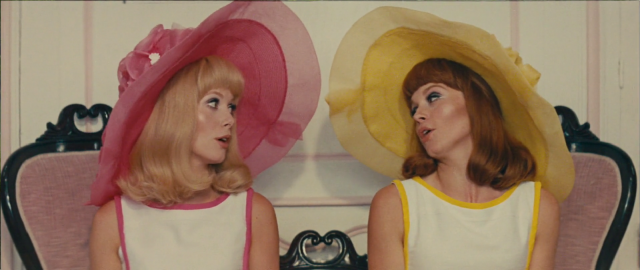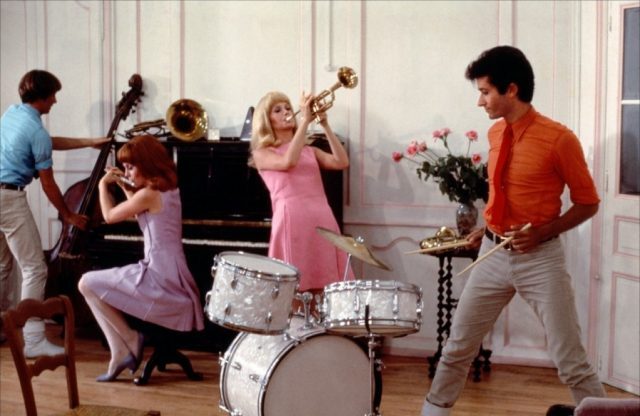
Real-life sisters Catherine Deneuve and Françoise Dorléac play Gemini twins in Jacques Demy’s The Young Girls of Rochefort
THE YOUNG GIRLS OF ROCHEFORT (LES DEMOISELLES DE ROCHEFORT) (Jacques Demy, 1967)
Rubin Museum of Art
150 West 17th St. at Seventh Ave.
Friday, October 27, $10, 9:30
Series continues Friday nights through April 28
212-620-5000
rubinmuseum.org
 When asked why he chose The Young Girls of Rochefort for the Rubin Museum Cabaret Cinema series “Soundtrack,” being held in conjunction with the exhibition “The World Is Sound,” movie executive Jack Lechner explained, “In addition to being the single biggest influence on Damien Chazelle’s La La Land, Jacques Demy’s The Young Girls of Rochefort is the sheerest expression of pure joy in the history of movies — a nonstop celebration of song, dance, and romantic idealism.” Demy’s 1967 pastel-colored romp is all that and more, a swirling, twirling two-hour-plus party of music, missed connections, and murder. In the port town of Rochefort, a fair has come to town, including hot-to-trot carnies Etienne (George Chakiris, with songs overdubbed by Romuald) and Bill (Grover Dale, José Bartel), who spend a lot of time hanging out at a café right next to the town square, owned by Yvonne Garnier (Danielle Darrieux, the only one who does her own singing), who has grown twin girls, dance instructor Delphine (Catherine Deneuve, Anne Germain) and piano teacher Solange (Françoise Dorléac, Claude Parent), as well as a young son, Booboo (Patrick Jeantet, Olivier Bonnet). Local gallery owner Guillaume Lancien (Jacques Riberolles, Jean Stout) is in love with Delphine, but she wants nothing to do with him. Music store owner Simon Dame (Michel Piccoli, Georges Blaness) is trying to arrange a meeting between Solange, who has written a symphony, with his very successful conservatory friend, Andy Miller (Gene Kelly, Donald Burke). Meanwhile, blond sailor and painter Maxence (Jacques Perrin, Jacques Revaux) has drawn a picture of his ideal woman — a dead ringer for Delphine — but circumstances keep preventing them from bumping into each other. Meanwhile, the perky Josette (Geneviève Thénier, Alice Gerald) serves such regulars as Dutrouz (Henri Crémieux) and Pépé (René Bazart) in the café. Over the course of one rather long weekend, characters fall in and out of love, uncover family secrets, and keep missing one another as they sing and dance as if it’s the most natural thing in the world. And who’s to argue with them.
When asked why he chose The Young Girls of Rochefort for the Rubin Museum Cabaret Cinema series “Soundtrack,” being held in conjunction with the exhibition “The World Is Sound,” movie executive Jack Lechner explained, “In addition to being the single biggest influence on Damien Chazelle’s La La Land, Jacques Demy’s The Young Girls of Rochefort is the sheerest expression of pure joy in the history of movies — a nonstop celebration of song, dance, and romantic idealism.” Demy’s 1967 pastel-colored romp is all that and more, a swirling, twirling two-hour-plus party of music, missed connections, and murder. In the port town of Rochefort, a fair has come to town, including hot-to-trot carnies Etienne (George Chakiris, with songs overdubbed by Romuald) and Bill (Grover Dale, José Bartel), who spend a lot of time hanging out at a café right next to the town square, owned by Yvonne Garnier (Danielle Darrieux, the only one who does her own singing), who has grown twin girls, dance instructor Delphine (Catherine Deneuve, Anne Germain) and piano teacher Solange (Françoise Dorléac, Claude Parent), as well as a young son, Booboo (Patrick Jeantet, Olivier Bonnet). Local gallery owner Guillaume Lancien (Jacques Riberolles, Jean Stout) is in love with Delphine, but she wants nothing to do with him. Music store owner Simon Dame (Michel Piccoli, Georges Blaness) is trying to arrange a meeting between Solange, who has written a symphony, with his very successful conservatory friend, Andy Miller (Gene Kelly, Donald Burke). Meanwhile, blond sailor and painter Maxence (Jacques Perrin, Jacques Revaux) has drawn a picture of his ideal woman — a dead ringer for Delphine — but circumstances keep preventing them from bumping into each other. Meanwhile, the perky Josette (Geneviève Thénier, Alice Gerald) serves such regulars as Dutrouz (Henri Crémieux) and Pépé (René Bazart) in the café. Over the course of one rather long weekend, characters fall in and out of love, uncover family secrets, and keep missing one another as they sing and dance as if it’s the most natural thing in the world. And who’s to argue with them.

Sound is a key element in multiple ways in one of the grandest musicals ever made
Recently restored with the participation of Demy’s widow, fellow Nouvelle Vague master Agnès Varda, The Young Girls of Rochefort is a genuine treat for the eyes and ears. Deneuve and Dorléac are utterly delightful as the Gemini twins, wearing candy-colored dresses and dramatic hats (the glorious costumes are by Jacqueline Moreau and Marie-Claude Fouquet), everything gorgeously photographed by Ghislain Cloquet. (Sadly, Dorléac, Deneuve’s older sister in real life) died in a car accident a few months before the film was released; she was only twenty-five.) Demy wrote and directed the film, including penning the lyrics for Michel Legrand’s wide-ranging score, even giving an inside nod to the composer. While his previous film, 1964’s The Umbrellas of Cherbourg, featured every piece of dialogue being sung, The Young Girls of Rochefort mixes it up, much like the dancing, choreographed by Norman Maen; at any moment, some characters are dancing and others just sitting or walking, sometimes noticing each other with quick moves, and sometimes not, almost as if the worlds of fantasy and reality are side-by-side. Of course, this being Demy (Model Shop, Une chambre en ville), it’s not all sweetness and light. There’s a violent murderer on the loose, the military is marching through town, and Guillaume seems to be rather handy with a gun. “Trouble is everywhere,” Yvonne says. Several times Maxence notes that his return to Nantes, Demy’s own hometown, is “immi-Nantes,” and that goofy joke is one of the many sly elements that keeps the film sharp and edgy; the plot is built around everything being imminent to the point of intoxicating ridiculousness. In addition to also kvelling over abstract art (“Braque, Picasso, Klee, Miró, Matisse — that’s life!” Maxence declares), the film is surprisingly feminist. Delphine and Solange regularly add little quips, almost under their breath, refusing to be taken for floozies no matter how sexist and misogynist some of their suitors might be. And then, at the end, Demy literally and figuratively opens and closes one last door. The Young Girls of Rochefort is screening at the Rubin at 9:30 on October 27 and will be introduced by Lechner; “Soundtrack” continues Friday nights through December 15 with such other sound-specific films as Michael Powell and Emeric Pressburger’s I Know Where I’m Going, Gus Van Sant’s Elephant, and Lars von Trier’s Dancer in the Dark.